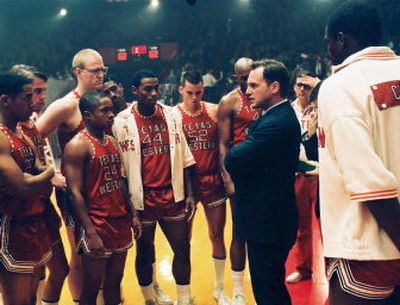Dream team

Given the number of African Americans playing professional and college basketball today, it’s almost impossible to imagine a time when a player’s skin color could keep him off the court.
But that was true as recently as the ‘60s, when major college programs – especially in the South – fielded predominately white squads and kept black athletes on the bench.
Change came from an unlikely source: Don Haskins, a young white coach at a small El Paso mining college who started an all-black squad in the 1966 NCAA Finals and defeated an all-white Kentucky team for the national championship.
“This changed the nation, it changed the sport,” says Jerry Bruckheimer, producer of “Glory Road.”
The film, opening today, recounts Haskins’ unlikely feat at Texas Western University (which later became the University of Texas-El Paso).
Josh Lucas, who plays Haskins in “Glory Road” and is from Arkansas, wasn’t familiar with the story of the Texas Western Miners, who overcame deeply ingrained racial stereotypes – as well as threats to their physical safety – to make history.
“It turned out to be a much more daunting task than I ever anticipated,” he says, “because I went into it a little blindly, in that I didn’t know how extraordinary Haskins was, and how extraordinary the story itself was, (and) how much people loved the story … particularly (in) El Paso.”
Lucas (“Sweet Home Alabama,” “Stealth”) wrote to the people of El Paso – his letter was published on the front page of a local paper – saying he understood “what responsibility I have here … and I will do everything in my power to capture the essence of what the story is and how Haskins was.”
“And then I had to do it,” Lucas adds. “I had Haskins there with me, watching me.”
Lucas says the now-retired Haskins, who was nicknamed “the Bear,” left an impression.
“The thing about Haskins is … there’s an intensity to the way he looks at you that actually can freeze you in your tracks,” Lucas says, “and what he did to me the first moment he met me was freeze me in a way. He gives you what I call the ‘Bear glare,’ and it’s a very intimidating force.
“What’s underneath it is a real sense of incredible moral integrity, in a way, and that what he’s constantly asking you to do as both a basketball player and as a man is to step up, in a sense.”
Also falling under Haskins’ watchful gaze was Lucas’ co-star Derek Luke, who plays Miners guard Bobby Joe Hill.
Luke (“Antwone Fisher,” “Friday Night Lights”) had never played competitive basketball, so he learned under the tutelage of consultant Mike Fisher and University of Southern California coach Tim Floyd, a former Haskins assistant who also coached the Chicago Bulls.
“That old boot-camp process,” Luke says. “It was two weeks, but it felt like six months.”
Luke says some “interesting guests” turned up, including Miami Heat coach Pat Riley, who played on the 1966 Kentucky team.
Although learning basketball was hard, dealing with the racism of the day was much tougher on Luke, who recalled a scene involving racial epithets written on the walls of the players’ motel room.
“I remember walking into the room. … I was like, ‘Oh my goodness, this is crazy,’ ” Luke says. “It was not acting.”
Luke says he, like many young African Americans, understands that his parents and grandparents leveled the playing field. But he says there is still prejudice in America, especially in the way cities are divided.
“To me, there’s still a separation, there’s a segregation, there’s a ‘You don’t go to that neighborhood,’ ” he says.
“I knew in my heart, because I saw it in my family, not to be a racist. My dad didn’t (just) have white people he knew. He had white friends … so I think, for me, whether it’s Hollywood or the NBA, that there is a responsibility to (rewrite) all those unsaid rules.”
Bruckheimer says “Glory Road” could be considered “edu-tainment,” in explaining a vital piece of basketball history.
“You want to show the African American kids the sacrifices that Don Haskins made, the seven players who played made, so they can play a sport they love in vast numbers,” he says, adding that he felt a duty to stay faithful because Haskins and many other key figures are still alive.
Lucas agrees.
“We realized the story itself was so powerful and dramatic,” he says, “there’s nothing to change.”